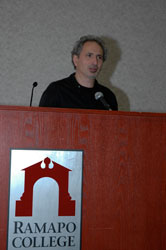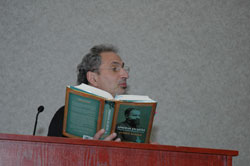- About Ramapo
- Academics
- Admissions & Aid
- Student Life
- Athletics
- Alumni
- Arts & Community
- Quick Links
- Apply
- Visit
- Give
Peter Balakian Discusses New Book
(PDF) (DOC) (JPG)November 12, 2009
 MAHWAH – Peter Balakian, an award-winning author and Bergen County native, spoke at Ramapo College of New Jersey on November 12 Under the auspices of the Center for Holocaust and Genocide Studies and the Armenian National committee of New Jersey.
MAHWAH – Peter Balakian, an award-winning author and Bergen County native, spoke at Ramapo College of New Jersey on November 12 Under the auspices of the Center for Holocaust and Genocide Studies and the Armenian National committee of New Jersey.
His third appearance at Ramapo, Balakian discussed his new book, “Armenian Golgotha.” Recently published by Alfred A. Knopf, it is the translation, on which Balakian collaborated with Aris Sevag, of his great great-uncle Rev. Grigoris Balakian’s first-person account of the Armenian Genocide, including his arrest and subsequent trek to avoid death at the hands of the Turkish authorities and their allies.
A uniquely insightful and compelling first person account of the Ottoman genocide of the Armenians, it is far from being simply a chronicle of oppression. Rather it, as Peter Balakian took pains to point out, a multidimensional rendering and reflection on a world that no longer exists. Finally available in English, it will enrich the study and remembrance of the Armenian Genocide for decades to come.
Cognizant of his and the other arrestees’ limited prospects for survival when they were shipped into the interior of the country, Balakian became a leader among his peers. His knowledge of languages, especially German, and penchant for diplomacy enabled him to gain unusual access to Ottoman and German officials and soldiers. Most importantly, perhaps, he was on several occasions able to intervene on behalf of his fellow refugees Balakian used his position to save the refugees from certain death by pleading with their captors or facilitating bribes. In some of these instances and generally to elude his Turkish oppressors, he put his talent to assume disguises from that of an Ottoman soldier to a German engineer to survive by, for example, finding work on the Berlin-Baghdad Railway and at various vineyards.
 A native of Bergen County, Peter Balakian earned his bachelor’s from Bucknell University, a master’s from New York University, and a doctorate from Brown University in American Civilization.
A native of Bergen County, Peter Balakian earned his bachelor’s from Bucknell University, a master’s from New York University, and a doctorate from Brown University in American Civilization.
He probably best known for his memoir “Black Dog of Fate,” the winner of the PEN/Albrand Prize for memoir, and “The Burning Tigris: The Armenian Genocide and America’s Response,” that won the 2005 Raphael Lemkin Prize. Both books were also New York Times and national best sellers.
However, Peter Balakian is also prolific poet, scholar and educator. The most recent of his five books of poems was “June-tree: New and Selected Poems 1974-2000, and he authored “Theodore Roethke’s Far Fields,” published by LSU Press in 1989.
He is also co-founder and co-editor with the poet Bruce Smith of the poetry magazine Graham House Review, which was published from 1976-1996, and is the co-translator (with Nevart Yaghlian) of the book of poems “Bloody News From My Friend” by the Armenian poet Siamanto.
In his academic career, Balakian has been at Colgate University since 1980 where he is currently Donald M. and Constance H. Rebar Professor of the Humanities in the department of English, and director of creative writing. He was also the first director of Colgate’s Center For Ethics and World Societies.
E-News Archives
| 2023 | 2022 | 2021 | 2019 | 2018 | 2017 | 2016 | 2015 | 2014 | 2013 | 2012 | 2011 | 2010 | 2009 | 2008 | 2007 |Copyright ©2025 Ramapo College Of New Jersey. Statements And Policies. Contact Webmaster.

Follow Us!